- Home
- Jeff Gunhus
Silent Threat Page 9
Silent Threat Read online
Page 9
Mara sensed that he wouldn’t push that hard unless he was on the right side of the argument. She had a sinking feeling that she was about to get her comeuppance. She rifled through the possible outs her dad had. How he could be right, even with all the evidence she’d just seen with her own eyes.
Then, like an image popping up on a screen, she got it.
“He’s not selling the AKs,” she said. “Or the other guns.”
“Nope.”
“He’s buying them,” she said. “Trying to get the big stuff off the streets.”
Her dad didn’t say anything. He didn’t need to. Just like when she was a teenager, once he’d won an argument, he just let her stew in her own juices. It was far worse than if he’d just come out and say she’d gotten it wrong. Not once, but twice about Harry.
But two could play that game. Even though he’d won, she wasn’t about to give him the satisfaction of an apology. Instead, she thought back to the way the big man had pulled her dad into a bear hug when they’d left. “What’d he whisper to you?” she asked.
“Offered to come with us. Didn’t figure that would be a good idea.” The light ahead turned yellow. He could have made it in time, but he slowed down and came to a stop.
“You’re getting cautious in your old age.”
“Caution isn’t always a bad thing,” he said. “In fact, we need to talk about the operation.”
“I’m listening.”
“This whole thing would be easier if just one of us did it,” he said. “Smaller footprint. Easier to slip in and out.”
“I agree.”
He looked surprised, but pleased. “Good. I thought this was going to be a hard conversation.”
“Just let me know the questions you want me to ask Townsend, and I’ll let you know what he says.”
“Mara.”
He growled her name, and for a split second she was a kid again, caught not doing her homework, or sneaking out to meet her boyfriend. She pushed the feeling away. “Do you really think I’m going to bow out? If Townsend has the information we need to get to Joey, then I’m going to be there.” He turned the corner and the Tribune Tower loomed up before them on the other side of the bridge, imposing as a medieval fortress. “So this plan had better work because we’re both in.”
CHAPTER 10
Preston Townsend stared out of the window of the black Suburban, barely registering the Chicago landmarks as they whisked by. The job of ex-president didn’t suit him. After a lifetime of laser-like focus on getting the world’s top job and eight years leading the Western world, he felt adrift since handing over the keys to 1600 Pennsylvania Avenue to that numbskull Patterson.
They were in the same party, but there was no love lost between them. After the scandals hit Townsend during the Republican primary to see who would run to replace him, he’d expected the others to distance themselves. But Patterson had not only run from Townsend as fast as his stubby little legs would carry him, he’d thrown him under the proverbial bus every chance he had. It wouldn’t have bothered him as much if Patterson hadn’t been his own goddamn vice-president.
Townsend had plucked the junior senator from Ohio from obscurity. The ungrateful son of a bitch had polled a one percent name recognition when they’d announced. Eight years later, Patterson was leader of the free world. And what thanks did he get? On the campaign trail, the puke had done nothing but kick his old boss in the dick every chance he got.
“Five minutes, Mr. President,” said the Secret Service agent from the front seat. He didn’t know the man’s name. Didn’t care to. He didn’t care about much, if he was being honest.
He had enough money in the bank, more than he or his wife could ever hope to spend. He’d seen the world and done it in style. After arriving in a foreign country in Air Force One, it was hard to fly any other way. Women still held his interest, and his wife didn’t care about his extracurricular activities, not after the entire world was now privy to his infidelity. But women weren’t really a challenge. No, he pined for the combat of politics and the national stage. He wanted to be where the action was. He wanted to be relevant again.
Instead, he was posing for photo ops, shilling for investment groups, giving the same, tired speech for a couple hundred grand a pop, half the fee that other ex-presidents commanded.
At least his memoir was keeping him busy. Random House had bought it for a record sum after he’d promised there would be honest revelations about the two scandals at the end of his presidency. He knew they, and the public, wanted the crude details of his affair with the wife of one of the Democratic party’s biggest donors. He would give them some of that. Why not? What did he care?
He felt his jacket pocket and the small bulge there of the silver cigarette case. The only copy of his manuscript. It was a risk, because if he lost it he’d have to start over from scratch. The thing was encrypted, completely useless to someone who might find it if it somehow fell out of his jacket, but he guarded it like it held the nuclear launch codes.
Some may have found the precaution extreme, but as president he was all too aware of the abilities the intelligence agencies had at their disposal. It was Hawthorn who had cautioned him while he was still in office to take care of what he typed, even into the computers in the White House. For all his most sensitive work, he used an air-gapped computer. No connection in any way to the Internet. Not even a modem in the machine that could make it possible. The thumb drive he stored his material on was one he’d purchased himself from a small electronics store in a Chicago suburb. He recalled how one of the greatest successes in cyberespionage had come from planting cheap thumb drives for sale in the stores around the NSA. Only those thumb drives had contained malware that infected whatever system they contacted.
He’d been careful. The only thing more hack-proof would have been to handwrite the book on paper, but that could be stolen. And it couldn’t be encrypted. No, he thought, feeling the slender case in his pocket, he’d taken all the right precautions. He didn’t want any leaks. Nothing to steal his thunder.
When he was ready, they would get more than they bargained for regarding what had really happened at the CIA and the outing of those agents in Russia. He was going to name names, consequences be damned. Not only that, but he was going to make a lot of fringe conspiracy theorists out there very happy. He planned to acknowledge the existence of Omega.
That was going to blow people’s minds.
Too bad he didn’t know more than he did. He would have loved to take all the bastards down and return the favor they’d done him when they’d ruined his legacy. All he had was the end of the smallest thread, but he knew others would pull on that thread to see where it went. He had an inkling that some of the world leaders who had turned their backs on him would find themselves implicated in Omega’s web. It would be his pleasure to watch them scramble.
He predicted that he’d have to fend off accusations that he knew more than he would admit in the book, but that would make for even greater controversy. There would be TV interviews, magazine covers, perhaps even congressional hearings with him as the star witness. The controversy would ensure the world’s spotlight would be on him once again.
History would forgive him schtupping some other guy’s trophy wife. Clinton had taken advantage of a poor intern and he turned out all right. But he was damned if he was going to let history judge him for the thing at the CIA. That hadn’t been his fault, and he was going to make sure blame was properly assigned where it belonged.
Even if doing so meant unleashing the powerful forces of Omega against him.
* * *
“Victorious arrival,” said the agent in the front seat into the radio in his sleeve. “Victorious” had been Townsend’s own pick for a name. The Secret Service historically picked their own call signs for their protectees, but when he’d heard that they’d chosen “Retriever” as his because he’d used his two Golden Retriever dogs in most of his campaign commercials, he’d put the brakes on
it. Retrievers worked for a master, and Preston Townsend acknowledged no master over him. Victorious suited him better.
Or at least it had. As they pulled up to the Tribune Tower, six paparazzi waited for him. Only six. He felt like taking a bullet. As an ex-president, it was a poor choice of words, but on some of his darker days he wondered whether it would be better to have been assassinated. Those guys got all the ink in the history pages. Lincoln may have screwed up Reconstruction if he hadn’t been killed. JFK may have gotten caught having his affairs and popping pills, except for Lee Harvey Oswald and a mail-order rifle. Instead, those guys were deities now, all of their imperfections washed away by the gush of national tears.
God, he wished that had happened to him. Maybe revealing the existence of Omega to the world would get him his wish.
Except that wish was self-pitying bullshit and he knew it. He didn’t want to die. It was too final. Talk about really being taken out of the action. No, his perfect scenario was to Tom Sawyer the whole thing. He wanted all the outpouring of love and grief, but he wanted to watch it on CNN from a suite at the Four Seasons.
“It’s the same speech as the Wells Fargo meet and greet,” said Mirren Lefoust, his post-presidency chief of staff. His old chief of staff, Travis Belmont, a college buddy no less, had abandoned ship as the Townsend presidency was taking on water in its last days and looked unsalvageable. The man had tendered his resignation via e-mail. E-mail, for Chrissakes. Preston Townsend remembered every slight, and he intended to get even.
“Did you hear me, Mr. President?” she said, holding out the speech to him.
“You want me to carry that around like some kind of jackass?” he said. “Keep it until we’re up there, for God’s sake.”
Mirren was unfazed. They were all used to him now, and that just depressed him even more. He used to make the Chairman of the Joint Chiefs of Staff quake in his boots. And now his staff disregarded him like he was someone’s crazy old uncle they’d agreed to watch for a while.
An agent opened the door and he climbed out. His sixty-one-year-old body had no complaints. He’d dropped a needed fifteen pounds since leaving the White House and he was in fighting shape. That was the problem with being a young president. You became a young ex-president.
His protective detail, four men this morning, took positions on either side of him, scanning the area from behind dark sunglasses. Townsend found himself wondering how effective his little team would fare if a terrorist group pulled up in a rented minivan and opened fire with machine guns. Despite his sporadic fantasies of martyrdom, he hated the idea of dying. He shuddered at the idea of an attack and tried to push it out of his head.
He’d pissed off more than his fair share of people while in office, even before the scandals. That list included every major terrorist organization, every gun nut in the United States who held a grudge over his gun laws, every white supremacist group who thought a Republican president ought to have been on their side; they hated him for his Civil Rights Bill and for appointing two African American judges to the Supreme Court, and the list went on.
He was glad ex-presidents continued to have protection details. But while the Secret Service would never admit it, the level of protection loosened up over time. The world moved on, and the threat to the old men who once held the nation’s top job moved on with it. The world’s haters turned their attention to the new person in office, and the old politicians were left out to pasture.
Two years removed from office and he already felt like he was wallowing in a Jimmy Carter type of obscurity. Although even Carter had a presidential library in Atlanta. So far discussions for the Townsend Library were on hold, waiting for “a better fund-raising environment,” according to the planners.
“Mr. President, so good of you to come,” an elderly gentleman said as Townsend approached a small clutch of people waiting in front of the door to address him.
“Stan Goldman, COA Investments,” Mirren whispered under her breath, just a little too loud so that the old man noticed.
Townsend caught it and faked a disappointed shake of the head. “Of course, I know Stan,” he said. “How are you?” Truth was he had no idea who Stan was and he didn’t care. His brain was on autopilot while he made small talk and cracked jokes. Stan showed off the tiny sliver of moon rock on display in the lobby and showed a model of the luxury condos being built in the building. Then, they went in the elevator for the ride to the thirty-fourth floor. He nudged Mirren and held out his hand for his speech.
He glanced it over on the ride up, made a few marks on applause lines and a joke that’d killed the last time he’d delivered it. There was nothing to it. Just a walk through the glory of the Townsend presidency, nary a mention of the scandals. He just wished that was the version in the history books.
* * *
The elevator door opened on an area that would one day be the showcase luxury penthouse apartment. The space was blown out, just white walls, high ceilings, and massive windows showing the Chicago skyline. The room was set up with a dozen round tables, eight seats each, just under a hundred people. Townsend noticed most of the tables were covered with the remains of a luncheon, but the two tables in the back were bare. He hadn’t even generated enough interest to fill a hundred-person room. At least they wouldn’t be eating during his remarks.
There was a small podium in the front of the tables with an American flag on either side of it. Red, white, and blue bunting on the podium was the only other attempt at decoration for the event. It made Townsend think of a kid’s birthday party more than a presidential address.
Still, as he entered the room, people rose from their seats and burst into applause. He still enjoyed that part. As a recorded version of “Hail to the Chief” played from the speakers, he dove in, his protection detail spreading out to the sides and one staying at his right elbow as he shook hands and posed for selfies.
After a minute of this, he turned to Mirren. “Let’s get this damn thing going so I can get the hell out of here. Old man Stan gives me the creeps.”
When Mirren moved to the side, Townsend saw Stan Goldman standing behind her. The elderly man’s smile was gone. He obviously overheard the comment. Townsend’s old impulses gave him three different ways to quickly fix it by taking Stan by the arm and turning it into a joke. But he stopped himself. What did he care? That was one of the benefits of being an ex-president, what could they do to him?
“This way to the podium, Mr. President,” Mirren said.
Townsend held up his hands and played it up as if he would have preferred to shake hands and visit with each person in the room individually. “Does Stan work all of you this hard, too? Sheesh.” Laughter from the crowd.
He walked up to the podium as people began to take their seats.
Then the fire alarm went off.
Everyone froze for a beat, looking at one another for confirmation that it was a drill or a false alarm. Everyone except for the Secret Service detail, which pushed through the crowd to get to their protectee. No one was shoved and no guns were drawn, but they got from their standing posts into a protective stance around the president in a matter of seconds.
“Status report?” the lead agent said into his mic.
Townsend saw each agent nod as the voice in their earpieces told them what to do next.
“What is it?” he demanded. “What’s going on?”
“Roger that. Moving Victorious to service elevator.”
As a team, the agents moved through the room, each with a hand on Townsend, helping him along.
“There’s a fire on one of the lower floors, sir. We’re taking you to a secure location until they contain it.”
Townsend shook the agents off of him. “Let go. I can walk on my own.”
The agents did as ordered, but they didn’t slow their forward momentum through the room, banging through a set of swinging doors into a staging area for the caterer. Cooks and waitstaff stepped back against the wall as the ex-president of the
United States passed by. There was an agent already standing by the service elevator, holding open the door.
“I thought you weren’t supposed to take the elevator in a fire,” Townsend said.
“The fire’s on the opposite side of the building. This is just a precaution.”
“It’s ridiculous is what it is,” Townsend said, but he climbed on the elevator anyway.
The doors shut with Townsend and three agents inside. As the elevator began its slow descent, the sudden silence felt awkward. Townsend pulled at his cuffs and smoothed out his suit.
“You guys didn’t have to . . . What the hell is that?”
He pointed up to the ceiling of the elevator. From openings in two different corners, white smoke was pouring in.
“You said the fire was on the other side of the building.”
The smoke continued to pour in. All of them coughed violently. One of the agents pulled his weapon, only to have it fall from his hand and clatter to the floor as he keeled over. The agents sagged to their knees, hacking. Townsend was the longest on his feet, but that didn’t last. He fell to the floor, collapsing on top of the agents under him, his face turned up to the ceiling.
As he lay there, he realized he was going to die. And all he felt was anger that his death was to be so much less dignified than what he deserved.
But then part of the ceiling moved. A large square lifted up and slid away. Then a flashlight shone down into the compartment, cutting through the smoke. A man wearing a mask swung into the elevator. The man pressed a button, stopping their descent.
The man was here to rescue him. He was going to live.
“Hi, Preston,” the man said, putting his face right in front of Townsend’s. “Remember me?”
Townsend blinked hard. He did remember. And he knew that voice.
Scott Roberts.
His last thought as he closed his eyes was that maybe he was right the first time. He was going to die in the elevator after all.

 Silent Threat
Silent Threat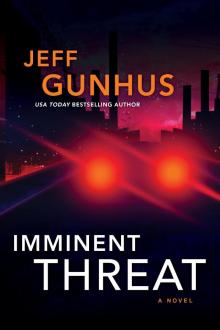 Imminent Threat
Imminent Threat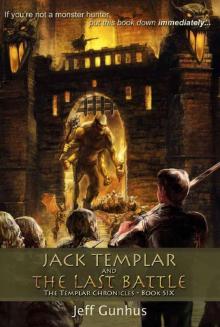 Jack Templar and the Last Battle
Jack Templar and the Last Battle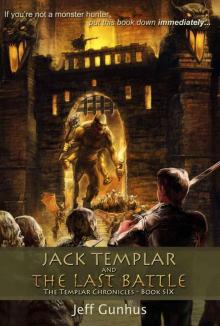 Jack Templar and the Last Battle (The Jack Templar Chronicles Book 6)
Jack Templar and the Last Battle (The Jack Templar Chronicles Book 6)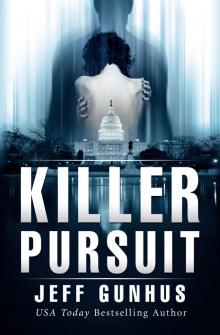 Killer Pursuit: An Allison McNeil Thriller
Killer Pursuit: An Allison McNeil Thriller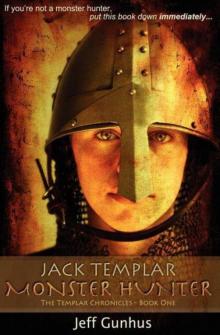 Jack Templar Monster Hunter
Jack Templar Monster Hunter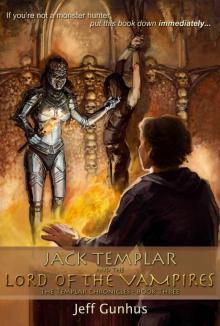 Jack Templar And The Lord Of The Vampires (The Templar Chronicles)
Jack Templar And The Lord Of The Vampires (The Templar Chronicles)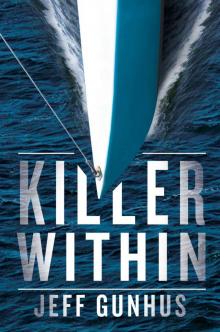 Killer Within
Killer Within The Torment of Rachel Ames
The Torment of Rachel Ames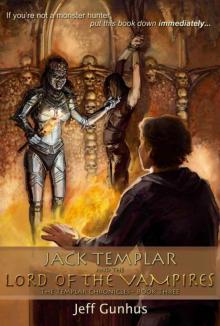 Jack Templar and the Lord of the Vampires
Jack Templar and the Lord of the Vampires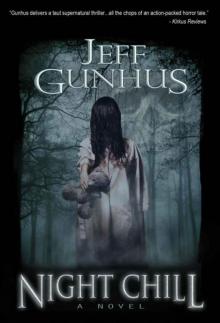 Night Chill
Night Chill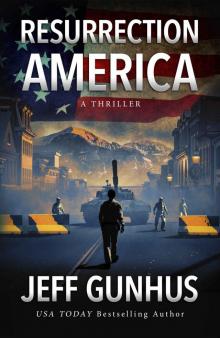 Resurrection America
Resurrection America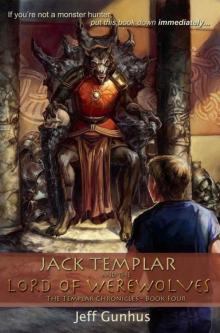 Jack Templar and the Lord of the Werewolves (Book #4 of the Templar Chronicles)
Jack Templar and the Lord of the Werewolves (Book #4 of the Templar Chronicles)